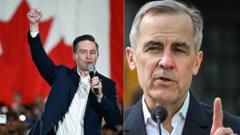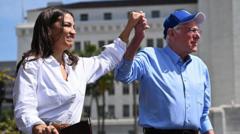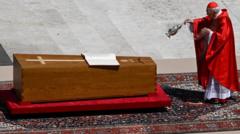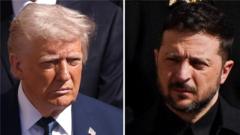Iran's Foreign Minister Abbas Araghchi announced readiness for talks with the US concerning its nuclear program, contingent on the cessation of military threats from President Trump. The upcoming discussions, slated for Saturday in Oman, are expected to be indirect, despite Trump's comments suggesting direct negotiations. Tensions remain heightened as the US maintains a tough stance amid Iran's violations of the 2015 nuclear deal, with both sides facing pressures regarding military options and diplomatic sincerity.
### Iran Open to Nuclear Deal, Sets Conditions for US Engagement

### Iran Open to Nuclear Deal, Sets Conditions for US Engagement
Iran's Foreign Minister states the country is willing to negotiate on its nuclear program if the US renounces military threats.
---
Iran's Foreign Minister Abbas Araghchi has expressed readiness for negotiations with the United States concerning its nuclear program, indicating a willingness to reach a deal if US President Donald Trump agrees to abandon what he describes as a "military option." The discussions, taking place in Oman on Saturday, will reportedly occur through indirect channels, contrary to Trump's recent claim of direct talks.
The context of these negotiations stems from Trump's withdrawal from the 2015 nuclear agreement that had initially aimed to limit Iran's nuclear capabilities in exchange for relief from economic sanctions. Since the US re-imposed sanctions, Iran has gradually breached the agreement's restrictions, claiming their nuclear activities are peaceful.
President Trump remarked that failing to secure an agreement would place Iran in "great danger," emphasizing the urgency of the talks. Meanwhile, Araghchi highlighted the need for mutual respect, urging the US to show it is serious about diplomacy and to adhere to any agreement reached.
The stakes in these negotiations are considerable. With the US seeking essential verification that Iran is not pursuing nuclear weapon capabilities, calls from Israel's Prime Minister Netanyahu for a "Libyan-style" dismantlement of Iran's nuclear programs add pressure to the talks. Iran, however, firmly opposes any such requirement and has reiterated its commitment to a peaceful nuclear agenda.
Araghchi concluded by stating that the current circumstances present both an opportunity and a challenge, underscoring Iran's skepticism regarding the US administration's intentions and approach. As this delicate situation unfolds, all eyes will be on Oman, where the future of talks will be determined amid complex political dynamics.
Iran's Foreign Minister Abbas Araghchi has expressed readiness for negotiations with the United States concerning its nuclear program, indicating a willingness to reach a deal if US President Donald Trump agrees to abandon what he describes as a "military option." The discussions, taking place in Oman on Saturday, will reportedly occur through indirect channels, contrary to Trump's recent claim of direct talks.
The context of these negotiations stems from Trump's withdrawal from the 2015 nuclear agreement that had initially aimed to limit Iran's nuclear capabilities in exchange for relief from economic sanctions. Since the US re-imposed sanctions, Iran has gradually breached the agreement's restrictions, claiming their nuclear activities are peaceful.
President Trump remarked that failing to secure an agreement would place Iran in "great danger," emphasizing the urgency of the talks. Meanwhile, Araghchi highlighted the need for mutual respect, urging the US to show it is serious about diplomacy and to adhere to any agreement reached.
The stakes in these negotiations are considerable. With the US seeking essential verification that Iran is not pursuing nuclear weapon capabilities, calls from Israel's Prime Minister Netanyahu for a "Libyan-style" dismantlement of Iran's nuclear programs add pressure to the talks. Iran, however, firmly opposes any such requirement and has reiterated its commitment to a peaceful nuclear agenda.
Araghchi concluded by stating that the current circumstances present both an opportunity and a challenge, underscoring Iran's skepticism regarding the US administration's intentions and approach. As this delicate situation unfolds, all eyes will be on Oman, where the future of talks will be determined amid complex political dynamics.




















